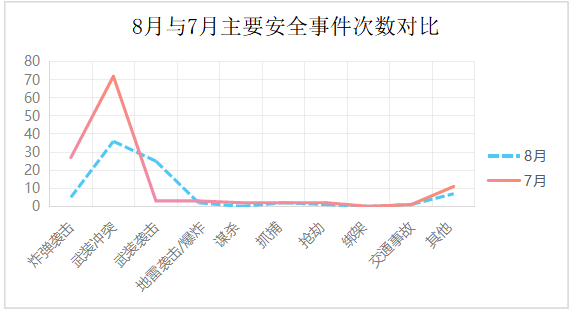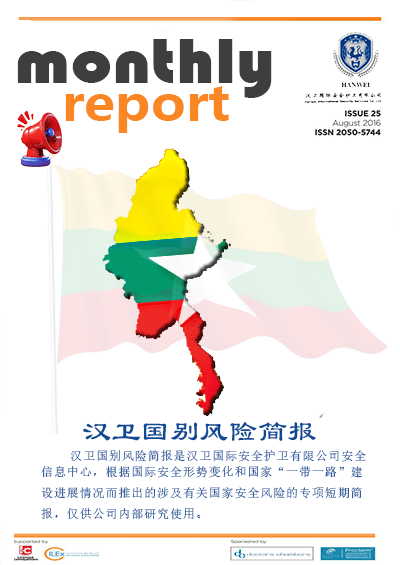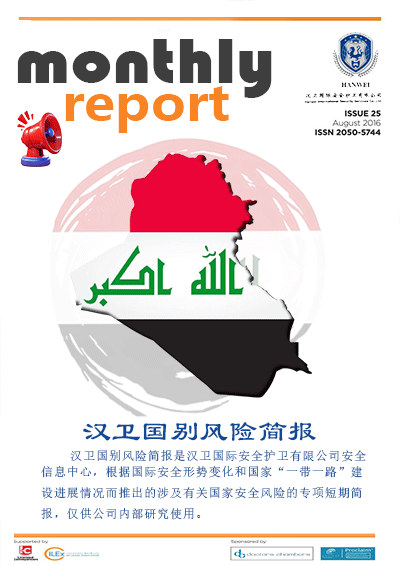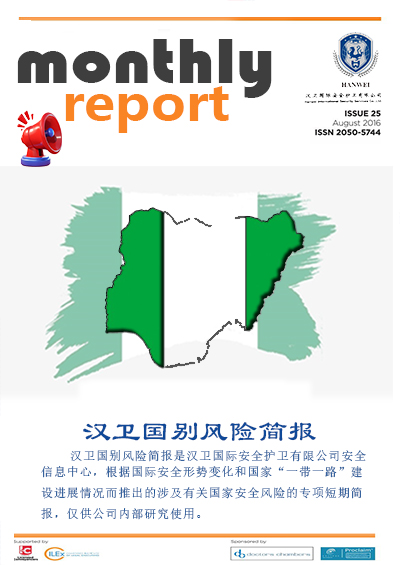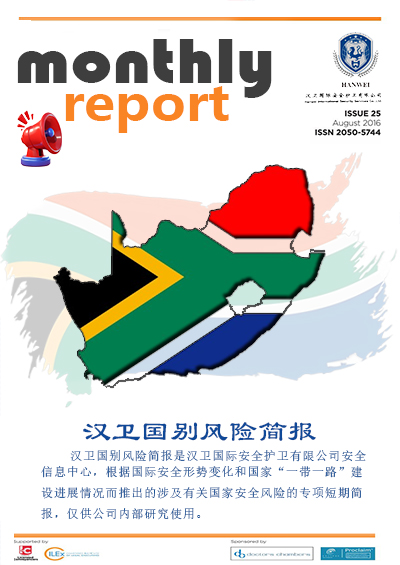Myanmar Risk Monthly Report August
According to the Hanwei International Security Public Opinion Report, there were 88 representative security incidents recorded in Myanmar in August, 44 fewer than in July. These incidents resulted in 35 deaths and 38 injuries. Among the categorized security events, armed conflicts and bomb attacks were predominant. Most security incidents occurred in Shan State, Mandalay, and other regions.
Hanwei International analysis indicates that Myanmar's security situation remains tense. Statistics show a decrease in security incidents compared to the previous month, along with reductions in both deaths and injuries. Myanmar plans to hold national elections in November 2025, the first since the military took power in 2021 and declared a state of emergency. Before the elections, instability in Myanmar is likely to remain the norm.
Regional challenges persist as international community supports Myanmar's elections.
On August 6, Thai Prime Minister Srettha Thavisin planned to appoint Foreign Minister Maris Sangiampong as chair of a soon-to-be-established special committee responsible for managing the political and military crisis in Myanmar. On August 12, China's newly appointed Ambassador Extraordinary and Plenipotentiary to Myanmar, Ma Jia, arrived in Yangon to assume his post. Upon arrival, Ambassador Ma was greeted by officials from Myanmar's Ministry of Foreign Affairs Strategic and Training Department and Protocol Department, along with key diplomats from the Chinese Embassy in Myanmar. Ma Jia is the 20th Chinese ambassador to Myanmar. On August 16, China, Laos, Myanmar, and Thailand held an informal quadrilateral foreign ministers' meeting in Chiang Mai, Thailand. Attendees included Chinese Foreign Minister Wang Yi, Lao Deputy Prime Minister and Foreign Minister Saleumxay Kommasith, Myanmar Deputy Prime Minister and Foreign Minister Than Swe, and Thai Foreign Ministry Permanent Secretary Saranrom Archavat. The Myanmar side briefed on the current situation and the government's efforts to maintain domestic stability, thanking the three neighbors for their assistance during Myanmar's difficulties. Myanmar expressed willingness to use this informal meeting to strengthen cooperation, enhance understanding, and achieve domestic stability and political reconciliation as soon as possible. Wang Yi expressed China's "three supports and three oppositions" policy to help Myanmar achieve stability, reconciliation, and development. On August 19, World Humanitarian Day, the UN warned that people across Myanmar are suffering due to conflict and disasters. Christina Powell, head of the UN Office for the Coordination of Humanitarian Affairs in Myanmar, stated that an estimated 18.6 million people, including 6 million children, require urgent humanitarian assistance. Aid workers are doing their utmost to provide food, shelter, and other assistance.
News reports indicate that at least three countries, including neighboring nations, have expressed willingness to support Myanmar's upcoming 2025 elections to be held by the State Administration Council (SAC). SAC Chairman Min Aung Hlaing stated that preparations are underway for the 2025 elections. Due to regional instability, SAC announced that elections would be prioritized in stable and peaceful areas. The Union Election Commission and major political parties scheduled an important meeting in Naypyidaw on August 24 as a key opportunity to discuss election preparations. The meeting agenda reportedly included not only exchanges and consultations between parties but also plans to invite ethnic armed groups engaged in peace talks with the military to broaden the dialogue. The Committee for Coordination of National Unity and Peace and the Political Parties Working Group held their second meeting on the morning of August 22 at the National Unity and Peace Center in Naypyidaw, continuing discussions on constitutional amendments and election-related issues to advance these critical political agendas. On August 24, at a meeting with political parties, Myanmar's SAC stated that relevant authorities are preparing for national elections in November 2025. SAC emphasized that this election represents the final step in its five-point roadmap. While SAC previously announced the next election would use proportional representation, the meeting did not specify which system would be adopted.
Kyat continues to depreciate, increasing living pressures.
On August 16, the Central Bank of Myanmar's exchange rate showed USD to MMK at 2100.00 (buying) and 2106.00 (selling). In northern Shan State's Muse city on August 10, the RMB to MMK exchange rate rose to approximately 100 RMB for 80,000 MMK, as confirmed by multiple currency exchange shops. Local residents reported that the kyat's depreciation and RMB's appreciation, along with exchange rate instability, are creating increasing difficulties for border traders. Myanmar's export goods have become more expensive due to road closures and poor transportation conditions, while imported Chinese goods face unpredictable costs from inconsistent customs fees. Merchants and locals report that foreign currencies are increasingly used for transactions in Myanmar-China and Myanmar-Thailand border areas due to the kyat's rapid depreciation. Merchant U Aung Bison explained that this trend stems from the kyat's devaluation. If the kyat stabilized at a certain level, it wouldn't be problematic, but rapid depreciation and high inflation have forced people to choose more stable foreign currencies (RMB or THB). While earning foreign currencies isn't an issue for border residents, those earning kyats but needing foreign currencies face significant living challenges. According to Myanmar Investment Commission data, foreign investment in Myanmar as of August this fiscal year was only $661 million. An economist noted that foreign investment inflows are declining, potentially mirroring last year's situation. Currently, Singapore, China, and Thailand are the top foreign investors, primarily in energy, gas, and oil manufacturing. On September 2, surveys showed Myanmar's manufacturing PMI hit a record low of 43.4 due to political instability and inflationary pressures reducing purchasing power. With PMI below 50 for two consecutive months, concerns grow over unprecedented pessimism in Myanmar's manufacturing sector, as worries about political and market stability severely impact future projections.
Basic goods prices surge as humanitarian aid expands.
Over the past seven months, dramatic fluctuations in the kyat's external value have caused significant price increases for basic necessities. U Aung Tun Lin, head of external relations at ISP Myanmar, noted that despite SAC and central bank measures to control inflation and currency depreciation, money printing and spending continue to fuel inflation. This depreciation significantly impacts Myanmar citizens' lives. One parent shared that due to conscription concerns, he sent his child to study in Thailand, but the kyat's sharp depreciation has increased living costs and created remittance difficulties. Official THB exchange channels offer limited amounts, while unofficial rates are unfavorable. Although RMB has depreciated, residents in Muse and Namhkam near the China-Myanmar border face dual pressures from rising Chinese currency values and food prices, making daily budgeting extremely difficult. Due to conflict, rental prices in Pathein, Ayeyarwady Region, have doubled. SAC's Housing Development Department-sold Omdanani apartments in Pathein now cost over 20 million kyats, up from 10 million.
On August 12, Lashio social rescue organizations began cremating victims' remains. Local officials reported most remains came from Ward 12, with gender indistinguishable due to prolonged exposure. A rescuer noted that while street remains have been cleared, many within communities remain unprocessed. As rescue groups are occupied with other operations, they've appealed for public information to assist. On August 27, Thailand donated another 9 million THB to support Myanmar's humanitarian efforts, implementing phase two of ASEAN leaders' five-point consensus to aid those affected by Myanmar's challenges. As part of a pilot program, Thailand delivered aid from Mae Sot to Karen State villages in March last year. The UN allocated $100 million in emergency funds to 10 countries including Myanmar, with Myanmar receiving $12 million for climate and conflict-displaced populations.
Regional conflicts continue as northern Myanmar fighting intensifies.
The People's Defense Force - Mandalay (MDY PDF) announced on August 11 the complete capture of the Myanmar military base in Siyeku, Thabeikkyin Township, Mandalay Region. MDY PDF and allied forces have captured nine camps in Thabeikkyin. On August 11 evening, heavy fighting between the Myanmar military and Ta'ang National Liberation Army (TNLA) in Hsipaw involved significant artillery. Clashes in Naungcho focused on Dangkan and Meimado villages, while Hsipaw battles centered around the military's 23rd Battalion. A local source reported increasing civilian casualties, with some residents trapped in conflict zones. On August 12 morning, clashes erupted between Myanmar military forces stationed at a Chinese gas distribution station in Tada-U, Mandalay, and revolutionary forces. On August 13, intense fighting occurred between Myanmar forces and Arakan Army (AA) in Kyauktaw, Rakhine State from 6:00 AM to 1:00 PM, near the police station, municipal office, power distribution center, university, and roundabout. On August 14, TNLA reported ongoing clashes in Naungcho and Hsipaw with 21 military airstrikes. Hsipaw's 23rd Battalion area saw continued conflict, with jets and Y-12s dropping 124 bombs. On August 16 evening, TNLA reported fighting in northern Shan State's Namtu and Naungcho, with military airstrikes supporting ground troops. On August 21 at 10:00 AM, two fixed-wing drones dropped 800g bombs on a camp in Sintgaing Township, Mandalay, injuring three. On August 24, reinforcements clashed with TNLA in Naungcho. On August 26, Operation Flame (OF) detonated two remote mines targeting Myanmar military camps 435-436 on Thanduma Road in Mayangon Township, Yangon. On August 27 early morning, airstrikes in Namtu killed two civilians and damaged two schools and homes.
Severe flooding has affected 56 townships across Naypyidaw, Mandalay, Shan, and Bago. Hanwei International recommends: minimize unnecessary outings; stock two weeks' to a month's worth of food and medicine; focus on post-disaster reconstruction; and remember emergency contacts: Myanmar Police: 0095-199, Myanmar Medical Emergency: 0095-192, Chinese Consulate in Mandalay: 0095-9-259172726, Chinese Embassy in Myanmar: 0095-9-43209657, Ministry of Foreign Affairs Global Consular Protection Hotline: 0086-10-12308 or 0086-10-65612308
Chart 1: August Security Incident Categories
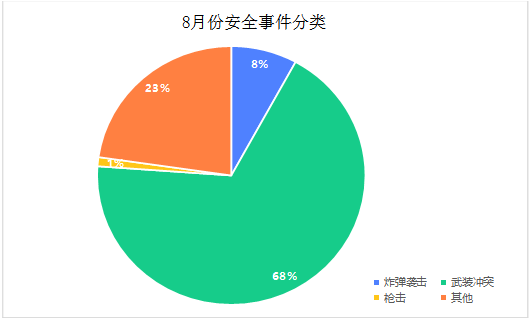
Chart 2: August Death/Injury Statistics
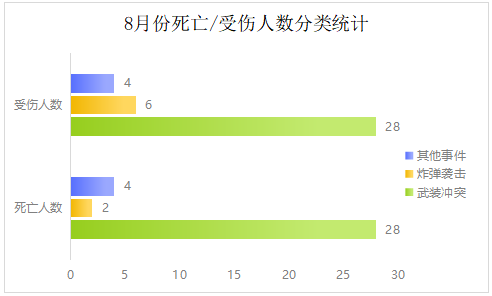
Chart 3: August Security Incidents by Major Region
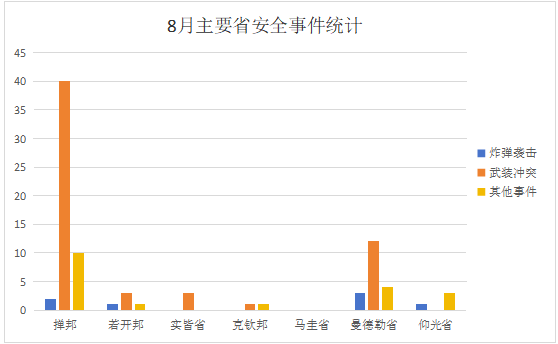
Chart 4: August vs July Major Security Incident Comparison
